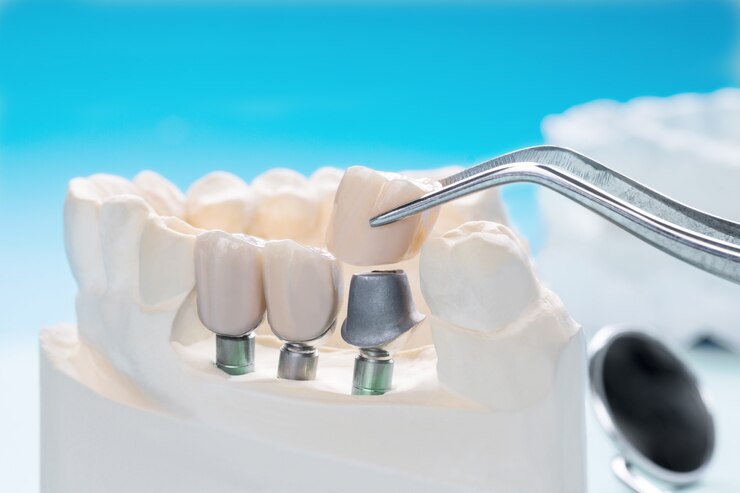If your dentist has recommended a crown, you might be wondering what exactly that means. You’re not alone. Many people hear they need a dental crown and immediately imagine something painful, complicated, or expensive. But the truth is, getting dental crowns in Cardiff is a common, straightforward procedure, and knowing what to expect can make the process much less stressful.
Let’s walk through what happens at your first appointment, the types of materials available, and what recovery usually looks like.
What Is a Dental Crown and Why Might You Need One?
A dental crown is like a cap that covers a damaged or weakened tooth. It helps protect the tooth from further damage and restores its normal shape, size, and strength. Dentists commonly recommend crowns for teeth that are:
- Cracked or broken
- Severely worn down
- Treated with a large filling
- Recently had root canal treatment
- Misshapen or discoloured
If you're dealing with any of these issues, dental crowns in Cardiff can be an excellent solution to save your natural tooth while improving how it looks and functions.
Your First Appointment: What Actually Happens
At your first appointment for a dental crown, your dentist will do a few key things. It’s helpful to know the process ahead of time so you can walk in feeling confident.
1. Examination and X-rays
Your dentist will begin by examining the tooth and surrounding area. They may take X-rays to check the tooth’s roots and make sure there’s no infection or further damage. If the tooth is healthy enough to support a crown, you’ll move on to preparation.
2. Numbing the Area
Don’t worry, your dentist will use a local anaesthetic to numb the tooth and surrounding gum. This step ensures that the procedure is as comfortable as possible for the patient.
3. Reshaping the Tooth
To prepare for the crown, the dentist will carefully reshape the tooth by filing it down. If your tooth is severely damaged or worn, it may need to be filled up with filling material first. This part takes precision, but it’s painless due to the numbing.
4. Taking Impressions
Once the tooth is shaped correctly, your dentist will take an impression of the area. This mould is used to create a crown that fits your mouth exactly. Some practices in Cardiff now use digital scanning instead of messy trays, which many patients find more comfortable.
5. Temporary Crown Placement
Due to the one or two-week timeframe for creating the permanent crown, your dentist will place a temporary crown to protect your tooth. This crown won’t be as strong or custom-colored, so you’ll need to be a little careful with it.
And that’s it for your first visit. You’ll be scheduled to return in about 2 weeks for the final crown placement.
Choosing the Right Crown Material
Dental crowns in Cardiff are not all created equal. Your dentist will talk to you about the best material based on your needs, but here’s a quick overview:
- Porcelain or ceramic: Great for front teeth because they look natural and match your tooth colour.
- Porcelain fused to metal (PFM): A strong option with a natural look, though the metal base may show slightly near the gumline over time.
- Metal crowns (gold or other alloys): This material is extremely durable and is ideal for molars that endure heavy chewing. Less common for visible teeth.
- Zirconia crowns: Popular for their strength and appearance. Often used on both front and back teeth.
Each type has its pros and cons, and your dentist will help you choose based on where the crown goes in your mouth and your personal preferences.
Recovery and Aftercare Tips
After your first appointment, you might feel some soreness around the tooth or gums once the numbness wears off. That’s normal. Here are some important points to consider:
- Avoid eating sticky or hard foods while you have your temporary crown.
- Brush gently around the area and avoid pulling floss straight up, which could loosen the temporary crown.
- If your temporary crown feels loose or falls off, contact your dentist immediately.
After the permanent crown is placed, your mouth will quickly adapt to it. Some people feel minor sensitivity for a few days, especially to hot or cold, but that usually fades.
Your crown can last between 5 to 15 years or longer, depending on your care. Remember to brush, floss, and attend regular dental checkups.
Final Thoughts
Getting a crown doesn’t have to be a mystery. When you choose trusted providers for dental crowns in Cardiff, the process is smooth, precise, and focused on your comfort.
Whether your tooth is cracked, decayed, or just in need of a cosmetic boost, a crown can help protect it and restore your bite. Understanding what to expect at your first visit and how to care for your crown afterwards can ease anxiety and help you make the best choice for your dental health.





Comments